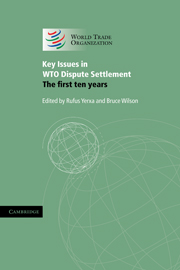Book contents
- Frontmatter
- Contents
- Notes on contributors
- Preface
- Table of cases
- Abbreviations
- PART I Introduction and General Considerations
- PART II The WTO Dispute Settlement System: Its Processes and Its Institutions
- 3 The WTO dispute settlement system and its operation: a brief overview of the first ten years
- 4 The role of the Dispute Settlement Body in the dispute settlement process
- 5 Consultations and the panel process in the WTO dispute settlement system
- 6 Contingent trade remedies and WTO Dispute Settlement: some particularities
- 7 The making of the ‘World Trade Court’: the origins and development of the Appellate Body of the World Trade Organization
- 8 Special challenges at the appellate stage: a case study
- 9 The reasonable period of time for compliance with rulings and recommendations adopted by the WTO Dispute Settlement Body
- 10 Implementation of panel and Appellate Body rulings: an overview
- 11 A brief introduction to countermeasures in the WTO dispute settlement system
- PART III The WTO Dispute Settlement System: Systemic and Other Issues
- PART IV Annexes
9 - The reasonable period of time for compliance with rulings and recommendations adopted by the WTO Dispute Settlement Body
from PART II - The WTO Dispute Settlement System: Its Processes and Its Institutions
Published online by Cambridge University Press: 04 August 2010
- Frontmatter
- Contents
- Notes on contributors
- Preface
- Table of cases
- Abbreviations
- PART I Introduction and General Considerations
- PART II The WTO Dispute Settlement System: Its Processes and Its Institutions
- 3 The WTO dispute settlement system and its operation: a brief overview of the first ten years
- 4 The role of the Dispute Settlement Body in the dispute settlement process
- 5 Consultations and the panel process in the WTO dispute settlement system
- 6 Contingent trade remedies and WTO Dispute Settlement: some particularities
- 7 The making of the ‘World Trade Court’: the origins and development of the Appellate Body of the World Trade Organization
- 8 Special challenges at the appellate stage: a case study
- 9 The reasonable period of time for compliance with rulings and recommendations adopted by the WTO Dispute Settlement Body
- 10 Implementation of panel and Appellate Body rulings: an overview
- 11 A brief introduction to countermeasures in the WTO dispute settlement system
- PART III The WTO Dispute Settlement System: Systemic and Other Issues
- PART IV Annexes
Summary
Introduction
The need for a reasonable period of time for the implementation of rulings and recommendations adopted by the Dispute Settlement Body (DSB) arises in two situations: first, when the responding party in a dispute settlement proceeding has been found to have violated WTO rules or otherwise nullified or impaired benefits accruing to the complaining party; and second, when the incriminated measure is still in existence at the time when the responding party that has ‘lost’ the case has to inform the DSB of its intentions in respect of implementation. For this purpose, a DSB meeting has to be held within 30 days after the adoption of the panel report and, if applicable, the Appellate Body report.
According to the Understanding on Rules and Procedures Governing the Settlement of Disputes (DSU), prompt compliance is the rule and the conferral of a reasonable period of time for implementation is supposed to be the exception. Article 21.1 of the DSU specifies that prompt compliance with recommendations or rulings of the DSB is essential for the effective functioning of the WTO dispute settlement system. Only if compliance without delay is ‘impracticable’ is a ‘losing’ party entitled to a reasonable period of time.
The starting point for the calculation of a reasonable period of time is the date of adoption of recommendations or rulings by the DSB (in other words, the date when the DSB adopts the panel and Appellate Body reports).
- Type
- Chapter
- Information
- Key Issues in WTO Dispute SettlementThe First Ten Years, pp. 88 - 97Publisher: Cambridge University PressPrint publication year: 2005
- 2
- Cited by



